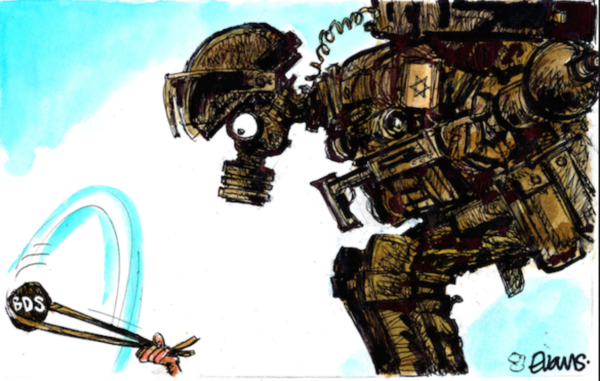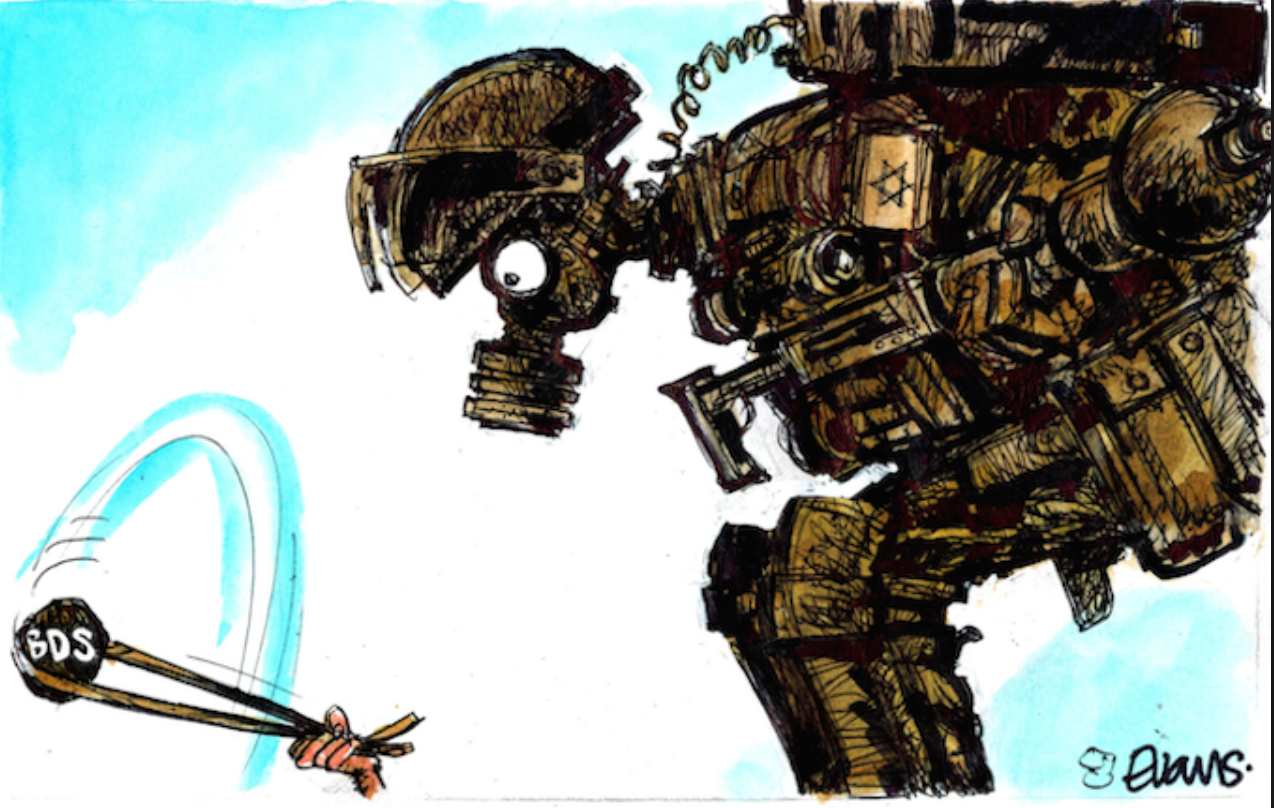
Last month, on 20 February, during one of the Israeli Occupation Army’s habitual night-time invasions of Palestinian homes, Israeli soldiers, knowing beforehand that their intended victim, Munzer Mizhar, was an ailing and helpless middle-aged blind man, stormed into his home and beat him up – in his bed – in front of his wife and children. The soldiers held up the helpless man’s face, the more easily to punch it, again and again, unmercifully. The soldiers restrained the man’s wife, also physically weak, from helping her husband and forced their children to kneel, with faces to floor, listening to their father’s suffering.
The Israeli Army later issued an official statement justifying the crime with the cold and cynical words that they had “tried to examine a Palestinian man who shouted and acted disruptively.” Munzer Mizhar, is a 47-year-old diabetic. He became blind 15 years ago and, for the past 11 years, has been on dialysis. He has had to have his big toes amputated and is so weak that, far from being able to shout, can only whisper.
While Palestinians are forced to live under such brutal, ideologically-driven Israeli military dictatorship, the mainstream news media and western politicians continue to behave as though it isn’t happening. Instead of exposing the evil and acting to bring the perpetrators to account, in accordance with international law, their silence leaves the last word to the Israeli Army with its sterile comment: “The incident was investigated and appropriate conclusions were drawn.”
It is imperative that we take action now – and this recently-published UN Human Rights Council (UNHRC) report and appeal (see below) offers an opportunity that it would be criminal not to embrace.
On 18 May 2018, the UN Human Rights Council (UNHRC) adopted resolution S-28/1 to urgently dispatch an independent, international commission of inquiry to investigate all alleged violations and abuses of international humanitarian and human rights law during the large-scale civilian Great March of Return protests that began on 30 March 2018. The full report on this inquiry was published on 25 February 2019 and has now been presented to the Fortieth Session of the UNHRC. See also Right of Return and Palestinian Refugees. The inquiry found that Israeli forces killed and maimed unarmed civilians, who posed no threat. Under international law, Israel’s repeated attacks on civilians, with the targeting of children and people such as paramedics, news reporters and the disabled, are held to be war crimes. Palestinians have a stark choice – protest or subservience. The demands of the Great March of Return are reasonable and just. Palestinians are risking their lives in their appeal for an end to the blockade of Gaza, and for recognition and implementation of the basic right of Palestinian refugees to return to their homes.
Summary:
The enquiry found that in Gaza during the Great March of Return protest, from 30 March 2018 to 31 December 2018:
■ Israeli Army snipers shot over 6100 protesters
■ Israeli Army sniper fire killed 183 protesters
■ Israeli Army snipers shot and killed 35 children (aged under 18 years)
■ Israeli Army snipers shot and wounded 905 children (aged under 18 years)
■ Israeli Army snipers shot and killed 2 identifiable news reporters
■ Israeli Army snipers shot and wounded 37 identifiable news reporters
■ 81% of wounds were to protesters’ legs
■ Amputations: 122 people needed to have either one or both legs amputated
Retaliatory Palestinian Resistance:
■ Hundreds of hectares of land in southern Israel burned by incendiary kites and balloons
■ View revealing video evidence screened at UN Human Rights Council meeting, 28 February 2019.
The commission recommends that the United Nations High Commissioner for Human Rights manage the dossiers on alleged perpetrators, to be provided to national and international justice mechanisms, including the International Criminal Court, undertaking credible and independent investigations into alleged international crimes and violations.
Under international humanitarian law, the principle of proportionality governs the legal use of force in an armed conflict, whereby belligerents must make sure that the harm caused to civilians or civilian property is not excessive. Clearly, when unarmed civilians are targeted, any use of military weaponry is excessive and criminal, particularly when international law recognises the right of civilians to resist foreign military Occupation. When such forces deliberately shoot unarmed people, especially children and those who are handicapped, and when they destroy civilian property and livelihoods, they are guilty of war crimes. That the malevolence is intentional is undeniable, with hospitals reporting increasing numbers of longer-term, and even permanent, disabilities imposed by Israel’s use of explosive bullets, clearly in order to increase suffering.
One witness in Gaza described Israeli Army targeting of protesters as follows:
“The sniper bullets don’t come in quick succession. It’s not a barrage of fire. It is methodical, patient, precise. A single shot rings out and someone falls. You wait a few minutes. The crosshairs settle on the next target. Another shot, another body drops. Again and again and again. It goes on for hours. This is how the Israeli military shot more than 1,350 Palestinians in Gaza on a single day, on May 14. Slowly. As at least 60 people were being killed and over 2,700 wounded.”
Razan Najjar, a member of the Palestinian Medical Relief Society, was wearing a white paramedic vest and standing with other paramedic volunteers when an Israeli sniper shot her in the chest on 1 June 2018. Another victim, Yasser Murtaja, was wearing a bulletproof vest, with the word PRESS across the front, when Israeli snipers killed him with a bullet to the abdomen. The individuals who commit such acts and their commanders should face prosecution.
UN Commission’s appeal to member states
The final two paragraphs of the report state:
127. The commission recommends that States Members of the United Nations consider imposing individual sanctions, such as a travel ban or an assets freeze, on those identified as responsible by the commission.
128. The commission recommends that States parties to the Geneva Conventions and/or to the Rome Statute carry out their duty to exercise criminal jurisdiction and arrest persons alleged to have committed, or who ordered to have committed, the international crimes described in the present report, and either to try or to extradite them.
For more than a decade Palestinians in Gaza have been living under a military blockade that has resulted in over 80% of the population reliant now upon international assistance, merely to survive. The United Nations has been warning the world that if Israel’s brutal blockade and attacks on the environment and infrastructure are allowed to continue, then Gaza will be uninhabitable by 2020. Israel and its supporters attempt to justify their crimes by claiming that they are committed in defensive response to Palestinian missiles. In fact, Israeli ceasefire violations vastly outnumber Palestinian attacks – even those acts of Resistance directed solely against the Israeli military.
We must speak out in support of justice and international law. This latest evidence presented by the UN requires that Israel be held accountable. At the end of 2016, New Zealand played a vital role in helping to secure the passing of UN Security Council Resolution 2334, declaring Israel’s settlement activity to be a flagrant violation of international law, having no legal validity. Our joint effort at the UN Security Council was approved universally by supporters of human rights. It is time, once more, for New Zealand’s voice to be heard in defence of international law and justice and a reaffirmation of the declaration of principles outlined in:
Jacinda Ardern’s statement to the UN General Assembly
On 28 September 2018, our Prime Minister addressed the United Nations General Assembly for the first time, making a principled stand against racism and in support of international human rights and justice. She remembered with pride this country’s challenge to South African apartheid. Jacinda also declared her pride in the charters and rules, accepted international norms and human rights provisions that were collectively established through internationally-agreed conventions. Our PM also observed “. . . governments do have obligations to their people and each other, and that our actions have a global effect.”
Jacinda Ardern noted before the General Assembly that “the debate and dialogue we hear globally is not centred on the relevance and importance of our international institutions. Instead, we find ourselves having to defend their very existence. That surely leaves us all with the question, how did we get here, and how do we get out?” The answer to that question came partly from our Prime Minister herself when she said “as politicians and governments, we all have choices in how we respond to these challenges.” She spoke of the need to reform the Security Council, saying: “if we want the Council to fulfil its purpose of maintaining international peace and security, its practices need to be updated so it is not hamstrung by the use of the veto.” Jacinda Ardern also urged the General Assembly to “remember the core values on which the UN was built. That all people are equal. That everyone is entitled to have their dignity and human rights respected.”
End the silence, tell the NZ Government to welcome the UNHRC inquiry report with a call for sanctions, until Israel is seen, in practice, to respect Palestinian dignity and human rights.






Bastards!
Who would want anything to do with a supporter of such a regime.
Or any one who obstructs UN condemnation and action to stop such cruelty and inhumanity.
The UN was manipulated to sanction the existence of Israel and now it has a duty to rectify the monster of its creation.
“https://www.youtube.com/watch?v=dlfhoU66s4Y&bpctr=1552106125”
D J S
An ongoing international crime. We should break off all diplomatic contact with that zionist apartheid state!!
I’ll second that!
BDS is currently starting to hurt some Israeli interests and should be vigorously applied.
To assist identifying the corporates and firms assisting with brutal occupation of Palestine and the genocide, the UN has instigated a process to identifying those accomplices.
Boycott them and any others who deal with them.
https://www.ohchr.org/EN/HRBodies/HRC/RegularSessions/Session31/Pages/DatabaseHRC3136.aspx
Keep a watch for further details.
Comments are closed.